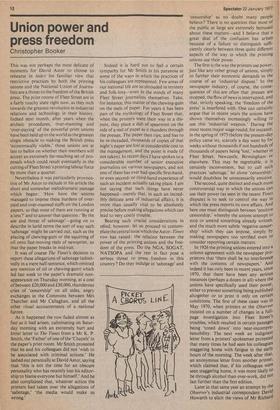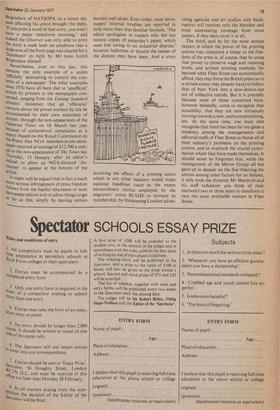Union power and press freedom
Christopher Booker
This was not perhaps the most delicate of moments for David Astor to choose to rehearse in Index his familiar view that restrictive practices by both the printing unions and the National Union of Journalists are a threat to the freedom of the British press. The pr int rooms of Fleet Street are in a fairly touchy state right now, as they inch towards the greatest revolution in industi ial relations and technology in their history. Indeed next month, after years when the archaic procedures, over-manning and 'over-paying' of the powerful print unions have been held up to the world as the greatest single obstacle to making the British press 'economically viable,' those unions are at last to ballot on whether their members will accept an extremely far-reaching set of proposals which could result eventually in the cutting of Fleet Street's printing labour force by more than a quarter.
Nevertheless it was particularly provocative of Mr Astor to include in his article the short and somewhat melodramatic passage which began : 'How have the unions managed to impose these burdens of overpaid and over-manned staffs on the London papers, so that most of them are running at a loss?' and to answer that question : `By the use and threat of sabotage'—going on to describe in lurid terms the sort of way such 'sabotage' might be carried out, such as the placing of chewing-gum or the squirting of oil onto fast-moving reels of newsprint, so that the paper breaks in mid-run.
It was of course The Times's decision to report these allegations of sabotage (admittedly in a mere half-sentence, which omitted any mention of oil or chewing-gum) which led last week to the paper's dramatic nonappearance on Thursday morning, at a cost of between £20,000 and 00,000, thunderous cries of 'censorship' on all sides, angry exchanges in the Commons between Mrs Thatcher and Mr Callaghan, and all the other ritual accoutrements of a national furore.
As it happened the row faded almost as fast as it had arisen, culminating on Saturday morning with an extremely hurt and bitter letter to The Times from a Mr K. P. Smith, the 'Father' of one of the 'Chapels' in the paper's print room. Mr Smith protested that he and his colleagues did not 'wish to be associated with criminal actions.' He lashed out personally at David Astor, saying that 'this is not the time for an obscure personality who has recently lost his editorship to blame everyone but himself.' And he also complained that, whatever action the printers had taken over the allegations of 'sabotage,' the media would make us wrong.' Indeed it is hard not to feel a certain sympathy for Mr Smith in his paranoia at some of the ways in which the practices of his colleagues are represented. Few areas of our national life are so shrouded in mystery and folk-lore—even in the minds of many Fleet Street journalists themselves. Take, for instance, this matter of the chewing-gum on the reels of paper. For years it has been part of the mythology of Fleet Street that, when the printers want their way in a dispute, they place a dab of spearmint on the side of a reel of paper as it thunders through the presses. The paper then rips, and has to be re-threaded, thousands of copies of that night's paper are lost at considerable cost to the management, and the point is made (if not taken). In recent days I have spoken to a
o
considerable number of senior executive journalists on various newspapers, and not one of them has ever had specific first-hand, or even secondor third-hand experience of such an incident actually taking place. I am not saying that such things have never happened—merely that, in such an incredibly delicate area of industrial affairs, it is more than usually vital to be absolutely precise before making allegations which can lead to very costly trouble.
Bearing such crucial considerations in mind, however, let us proceed to contemplate the central issue which the Astor–Times row has raised: the relation between the power of the pr inting unions and the freedom of the press. Do the NGA, SOGAT, NATSOPA and the rest in fact pose a serious threat to Press freedom in this country? Do they indulge in 'sabotage' and
'censorship' as no doubt many people believe? There is no question that most of the public at large are extremely bemused about these matters—and I believe that a great deal of the confusion has arisen because of a failure to distinguish sufficiently clearly between three quite different aspects of the way in which the printing unions use their power.
The first is the way the printers use power, just like any other group of unions, simPlY to further their economic demands in the course of an 'industrial dispute.' In the newspaper industry, of course, the consequences of this are often that presses are stopped, the flow of news is interrupted, and that, strictly speaking, the 'freedom of the press' is interfered with. One can certainly argue that in recent years the unions have shown themselves increasingly willing to use this 'industrial weapon.' During the most recent major wage round, for instance, in the spring of 1975 (before the present-day policy came in), scarcely a day went by for weeks without thousands if not hundreds of thousands of papers being 'lost,' whether in Fleet Stteet, Newcastle, Birmingham or elsewhere. This may be regrettable, it is certainly inconvenient, but to call such practices 'sabotage,' let alone 'censorshiP, would doubtless be unnecessarily emotive.
The second, quite distinct and much more controversial way in which the unions can use their power (as seen in the recent Times dispute) is to seek to control the way in which the press reports its own affairs. And here one must distinguish between 'positive censorship,' whereby the unions attempt to stop or amend something already written. and the much more subtle 'negative censorship' which they can impose, simply by making newspapers too terrified even to consider reporting certain matters.
In 1926 the printing unions entered into a solemn agreement with the newspaper proprietors that 'there shall be no interference with the contents of newspapers.' And indeed it has only been in recent years, since 1970, that there have been any serious instances (perhaps a dozen in all) where the unions have specifically used their power. either to prevent something being published altogether or to print it only on certain conditions. The first of these cases was in May 1970, when printers at the Observer insisted on a number of changes in a fullpage investigation into Fleet Street's troubles, which resulted in certain passages being 'toned down' into near-incomprehensibility. The next week an indignant letter from a printers' spokesman protested that many times he had seen his colleagues staggering home with fatigue in the earIY hours of the morning. The week after that, an anonymous letter from another printer, which claimed that, if his colleagues were seen staggering home, it was more likely to be through alcohol than over-work, did not last further than the first edition.
Later in that same year an attempt by the Observer's industrial correspondent David Howarth to elicit the views of Mr Richard Briginshaw of NATSOPA on a minor disPute affecting his union brought the reply, If you print a word of that story, you won't have a paper tomorrow morning,' and indeed the Observer was only able to print the story a ,week later on condition that a large area of the front page was cleared for a Statement' in reply by Mr (now Lord) Briginshaw himself. Nevertheless, even to this day, this remains the only example of a union Officially' attempting to control the contents of a newspaper. The other examples since 1970 have all been due to 'unofficial' action by printers at the newspapers concerned, ranging from the Evening Standard Printers' insistence that an 'offensive' cartoon about the power workers by Jak be accompanied by their own statement of Protest, through the non-appearance of the Financial Times on 18 March last year because of compositors' complaints at a report (based on the Royal Commission on the Press) that NGA members at one newspaper received an average of £12,500 a year, PP to the non-appearance of The Times last Thursday, 13 January, after its editor's refusal to allow an NGA-dictated 'disclaimer' to appear at the bottom of the article. It might well be argued that in fact a much ntore serious infringement of press freedom follows from the fearful reluctance of most newspaper editors ever to allow things to get 4s far as this, simply by leaving certain matters well alone. Even today, most newspapers' internal troubles are reported in little more than that familiar formula, 'The editor apologises to readers who did not receive copies of yesterday's paper, which were lost owing to an industrial dispute,' however ludicrous or bizarre the causes of the dispute may have been. And a story involving the affairs of a printing union which in any other industry would make national headlines (such as the recent extraordinary tactics employed by the engravers' union SLADE to increase its membership, by threatening London adver tising agencies and art studios with bankruptcy) still receives only the blandest and most unrevealing coverage from most papers, if they dare cover it at all. The third, and by far the most serious respect in which the power of the printing unions may constitute a threat to the freedom of the press is, of course, that by using that power to preserve wage and manning levels, and archaic printing methods, far beyond what Fleet Street can economically afford, they may force the British press (as to a ceitain extent they already have) to follow that of New York into a slow-drawn-out act of collective suicide. But it is precisely because most of those concerned have, however belatedly, come to recognise that possibility, that they are now tortuously moving towards a new, and morepromising, era. At the same time, one must also recognise that there has been far too great a tendency among the managements and editorial staffs of Fleet Street to blame all of their industry's problems on the printing unions, and to overlook the crucial contribution which they have made themselves. It should never be forgotten that, while the management of the Mirror Group all but gave up in despair on the Sun (blaming the unions among other factors for its failure), it only took the dynamic Mr Murdoch and his staff (whatever you think of their methods) two or three years to transform it into the most profitable venture in Fleet Street.



































 Previous page
Previous page